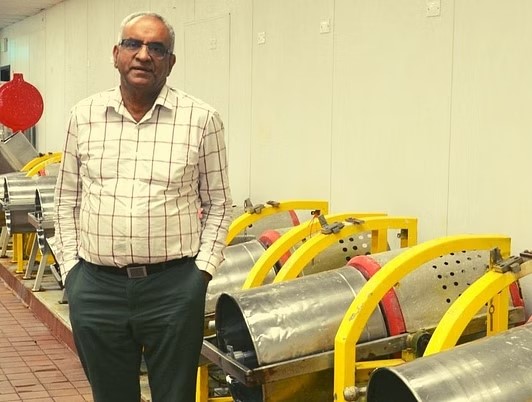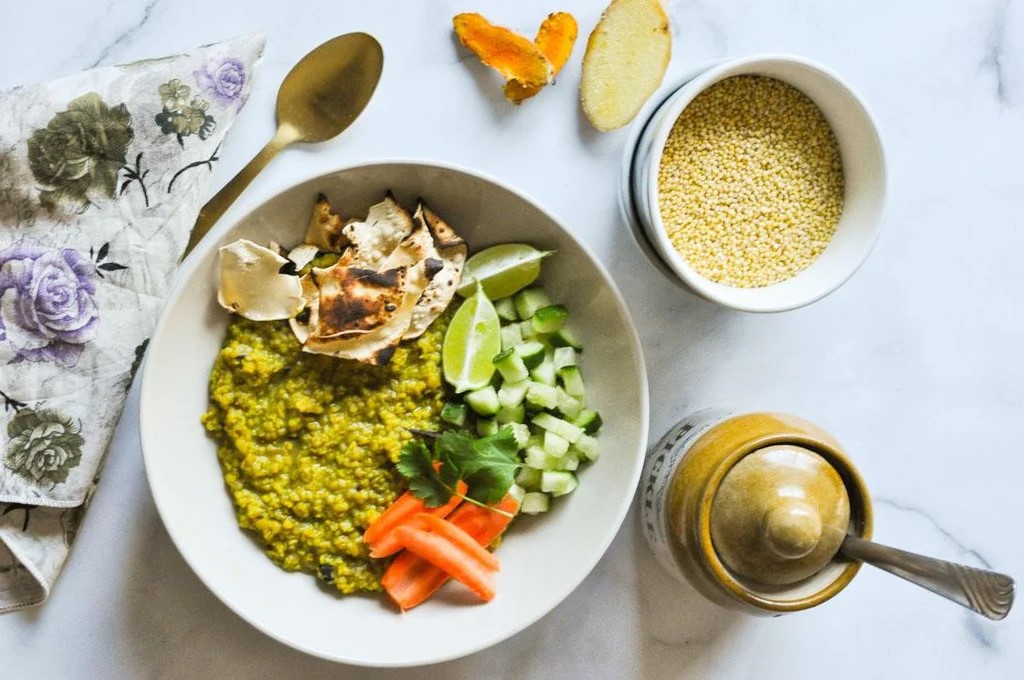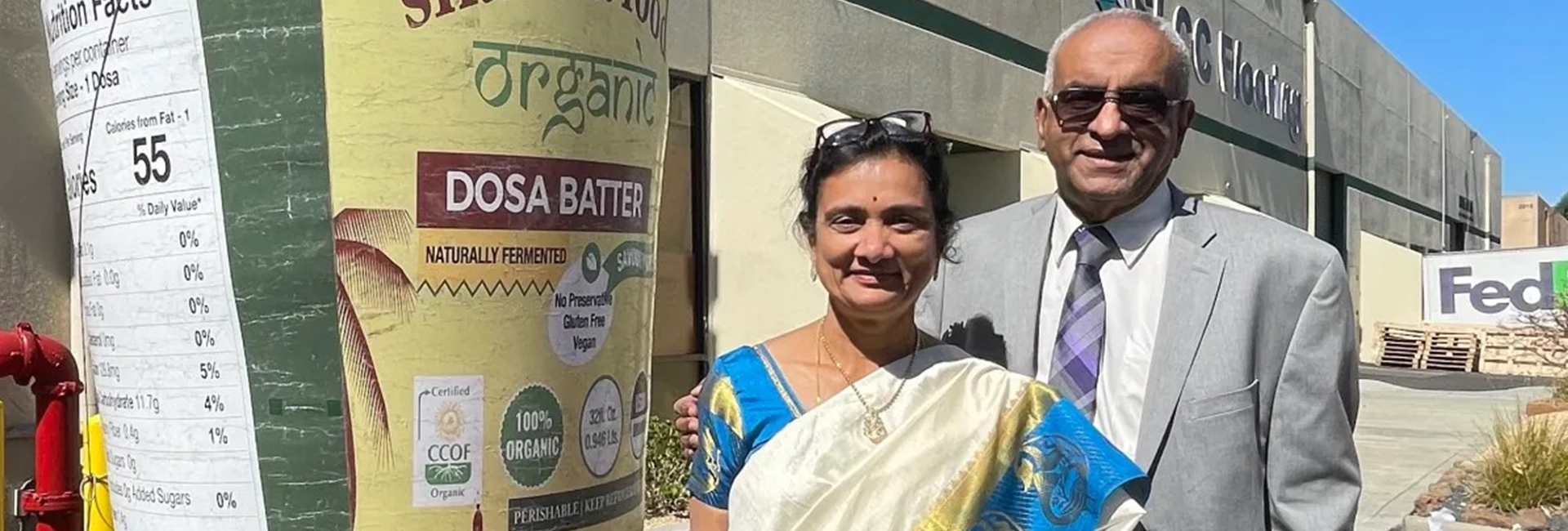(April 20, 2023) The year was 2003. Subramanian ‘Mani’ Krishnan was broke in the Bay Area, with a wife and two kids to feed. Work would begin early, by 7 am, when Krishnan and his wife, Anandhi, would begin preparing freshly-fermented dosa batter at their home in San Jose. Then, Krishnan would leave his house in San Jose, his car packed with 32-ounce containers filled to the brim. He would go from one grocery store to the next, requesting them to sell his batter. Mani Krishnan was in his forties, then, and had mortaged his house for his dosa batter business. “I thought it’s better to be miserable on your own than to work for someone else and be more miserable,” he reasoned. His idea was not new – there were many small-time, homespun ventures making dosa batter. A handful of stores agreed to stock his product, only if it sold. Still, demand was rising and Krishnan’s USP was his scientific method, his use of technology and the fact that he followed the FDA guidelines. Twenty years later, Mani Krishnan, the founder of Shastha Foods, is the undisputed ‘dosa king’ of the USA.
Shastha Foods has sold over 170 million ‘south Indian crepes’, as they are lovingly known by the non-Indian population. With the courage to take a risk, the determination to rise up from very challenging circumstances and unwavering belief in the potential that his childhood breakfast food – the dosa – held, Mani Krishnan doesn’t just sell food – he introduced South India’s best loved dish to an appreciative global audience. “I want to sell a billion dosas,” he often remarks. The company has 350 stores across the the US and Canada, functioning out of 35,000 sq ft, state-of-the-art manufacturing unit. Shastha’s dosa batter is a staple in Indian households in the west. The immensely popular video of Vice President Kamala Harris and Mindy Kaling making a masala dosa also features Shastha dosa batter.
Journey to the USA
Mani was born in Thirunelveli, a small town in Tamil Nadu (famous for its halwa, made from milk and wheat berries). Like so many thousands of others before him, Mani Krishnan arrived in the USA, in 1977, to join his family. He had a degree in commerce and some experience as an accountant in Mumbai. His family, who had moved there a few years prior, were living in San Jose, where Mani also set up his base.
He found a job at a tech company, realising early on that he didn’t want to work for someone else. So, he set up a hardware export business, sending hard disk drives, motherboards and processors to India. Business did well at first – this was at the start of the dot-com boom and although times were rough, Mani decided to stick with it. By the time the 1990s came to an end, the company folded. “When that business went south, I came to a point where I had to re-build my life from scratch. I was in my 40s then,” the Global Indian said.
Mani had to make ends meet, he had a family to sustain. He knew the export-import business and could see the Indian diaspora – and its demands – grow over the years. He decided to bring filter coffee powder, which every South Indian loves and longs for, to the US. It led to his million-dollar-idea – making idli and dosa batter. He noticed a rising demand for food – the Indian diaspora was growing and they longed for home food. Dosa and idli are the morning staples at most South Indian homes but making the batter is a time-consuming process. “We stumbled upon the idea to sell idli batter in 2003; we did not do a formal market study but we made an observation; it was the phase when there was a steady rise in Indian nuclear families in the US and people had no time to buy the rice, soak it, grind it and allow it to ferment,” he recalled. Mani cashed in, mortgaging his house to help him get started.

Mani Krishnan
Challenges to opportunities
This was 2003, and after the initial investment, Mani was left with very little. Failure just wasn’t an option. His wife, Anandhi, joined him and they began working out of their home kitchen, doing everything from manufacturing, to labelling and distribution. The couple would rise early, getting to work by 7 am and sitting by the 2-litre grinder to make dosa batter. After the batter was made and packed into 32-ounce containers, Mani would begin the hard journey around San Jose, dealing with sceptical grocery store owners.
“In good faith, I would leave our products with them. I would make regular calls to take follow-ups and even have to drive back to collect all the unsold packets and discard them,” he recalled. It was this perfectionism, this unerring attention to detail and top-class customer service, which paved the way for his success, much like Mafat Patel, co-founder of the Patel Bros chain of grocery stores. “There were already players in the market. I think the system that I created helped me maintain quality, ensure consistency in delivery and also scale up. I am proud to say that it is Indian technology in the US,” Mani said.
The Shastha Foods empire
At the end of their first year in business, Mani had paid off his mortgage and his delivery system had been upgraded from the backseat of his car to a refrigerated truck. “Soon, we out-grew that and we invested in small refrigerated trucks,” he said. These days, the delivery department is buzzing everyday, with over a dozen refrigerated trucks travelling through the city. There were challenges, though. The first was the ingredients themselves – rice and dal, which he bought from Africa, Dubai and the USA.
Over, 12,500 kilos of batter are made everyday, at the San Jose headquarters of Shastha Foods. The process, which Mani takes great pride in, is completely automated. Rice and dal are loaded onto an automatic weighing and dispensing machine, then soaked in water. The ingredients are cleaned and loaded on to custom-made stone grinders. “Every minute, four containers of Shastha idli batter are being sold across the US,” Mani told The Hindu. In 2017, the company also launched its organic products and they make batter with millet, as well as an Ayurvedic Khichdi mix.

Shastha Food’s millet khichdi
Customer is always king
Mani takes nothing for granted, he says. “For us, service and quality is paramount.So, if due to unforeseen circumstances, any item goes bad, I make sure to take personal responsibility for that and either issue a full refund or replacement.” As often as he could, Mani would drive up to meet customers personally, to take back a sub-par product and replace it.
Shastha Food now offers some 16 varieties of dosa batters and also sells essentials like rice, lentils, dals, pickles, sweets and millet-based items. And even after such success, Mani remains humble, a staunch advocate of high thinking and simple living. “A large house or a luxurious lifestyle was never a goal for me,” he said. “I know from experience that money comes and goes and so I wanted to create something that could make a meaningful difference.”
Follow Shastha Foods on Instagram and Mani Krishnan on LinkedIn.

